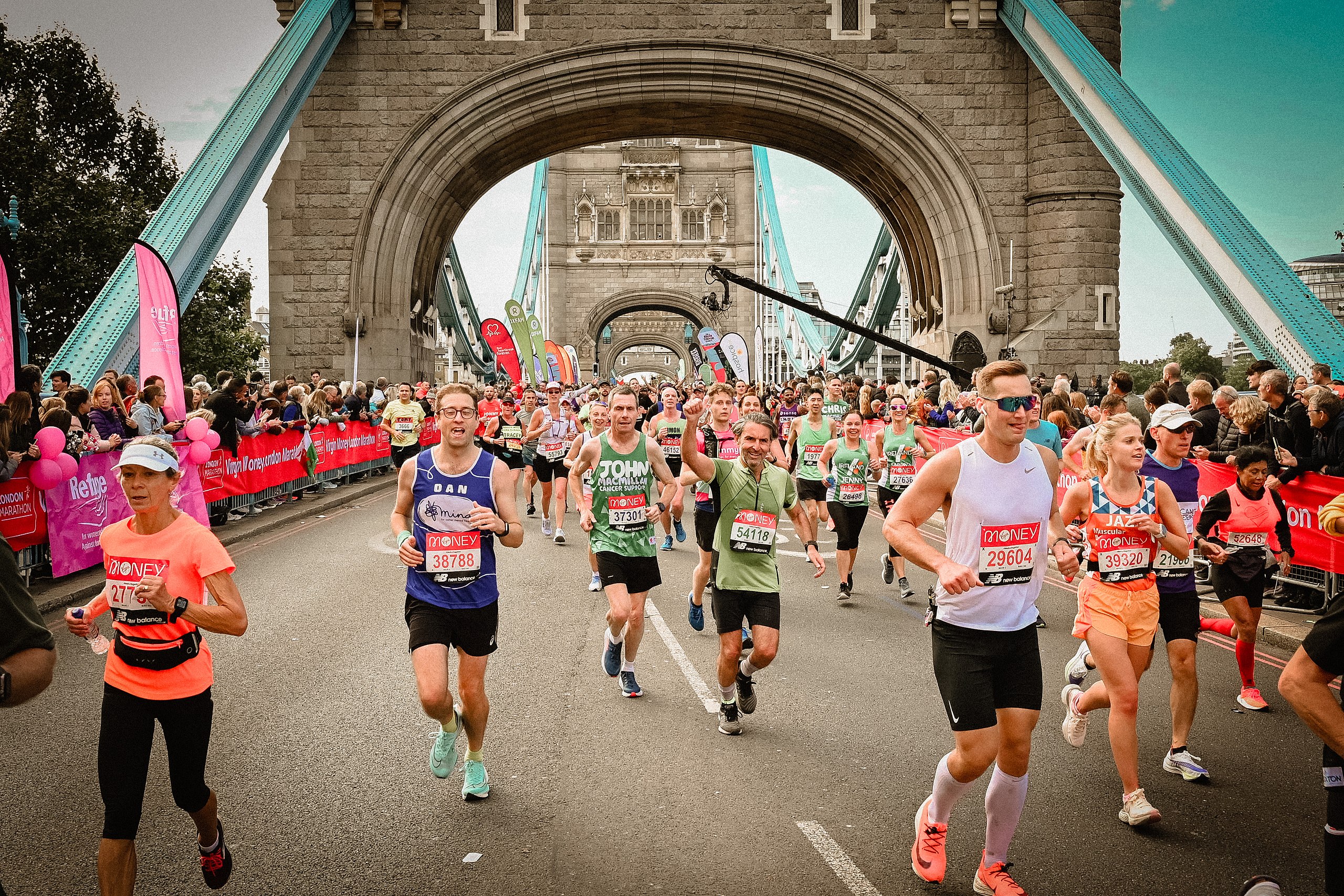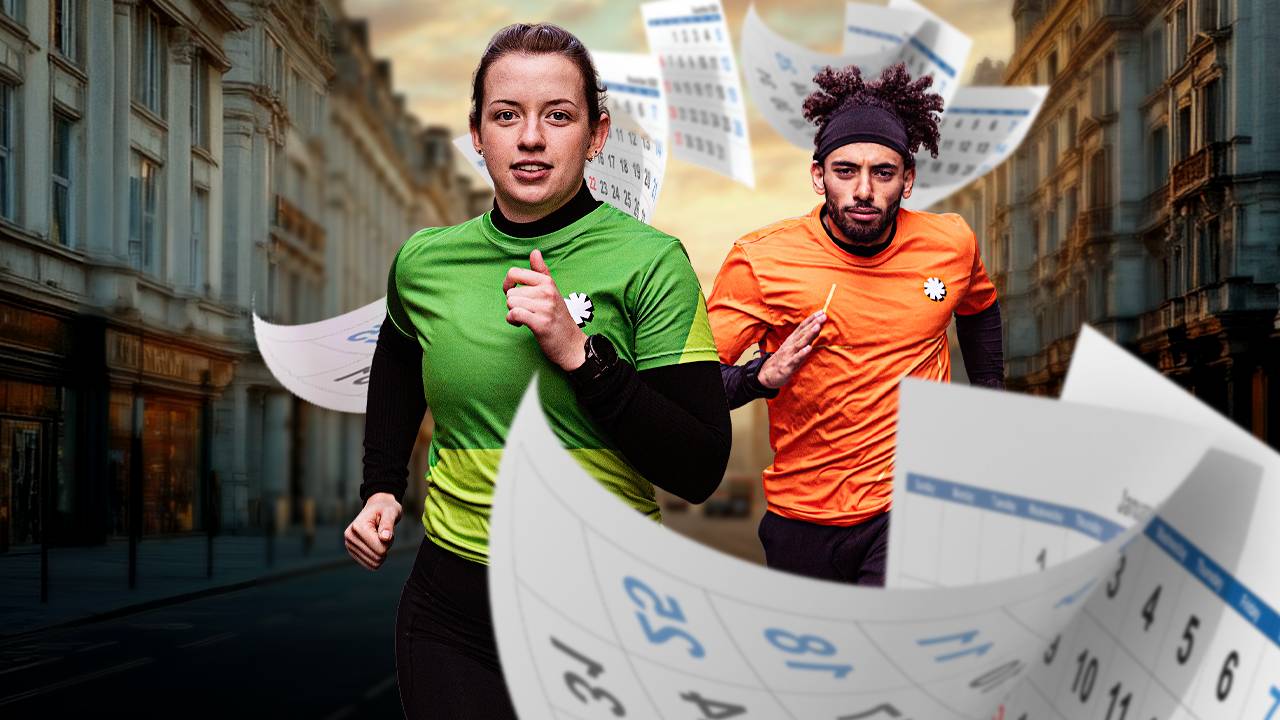How To Run Further Without Getting Tired

Do you want to run further but feel too tired to do so? Thankfully, we have some top tips to help you keep running for longer without experiencing fatigue.
1. Warm up
It’s always tempting to just get out the door and go, but if you want to run effectively and far it’s worth doing a warm up before you set off.
By doing some light drills, strides and dynamic stretches before you start running, you are easing yourself into motion and slowly raising your body temperature. This means a warmer cardiovascular system – your heart and blood vessels – which increases blood flow to your muscles. Warmer muscles lead to more effective movements that can help you run for longer while reducing your risk of muscle soreness and injury.
Once you’ve warmed up in this way, you can even precede your run with another few minutes of brisk walking or gentle jogging.
2. … And cool down
Although your run is technically ‘over’ by the time you do a cool down, it is an important step that helps you to build up the distance of your runs going forward.
Completing stretches as part of a cool down routine helps your body temperature and heart rate return to their normal levels, and minimises your chance of getting muscle cramps, aches and pains that could impede your next workout. This means you’ll feel fresher and more recovered ahead of your next run, and more capable of running further.
3. Start slowly
It can be very tempting to kick off a run at too fast a pace – especially if it’s a cold day, you’re tight on time, or you’re just so excited to be out running. Sometimes, we don’t even realise we’re doing this.
But, if you want to stay in it for the long run, resist powering on in this way and run at a slower pace. This means you’ll avoid overshooting and have more energy in the tank for the later stages of your long run.
If you’re running slowly enough, you should be able to maintain a conversation while doing so. If not, you’re going too fast! If you have the dynamic data available to you on a GPS running watch, you can also, of course, check your pace to make sure it stays in the ‘easy’ zone. Looking at your real-time heart rate data will also help you to gauge your effort as you run.
4. Check your form
If you want to run further, you’ll want to feel as comfortable as possible in the process – and having good running form is certainly going to help.
As you run, look ahead and keep your posture straight and tall, with your shoulders relaxed and level. If it helps, imagine there’s a piece of string coming out the top of your head pulling you up. It can be easy to lean forward or backwards at your waist and let your knees roll in as you start to fatigue, but be mindful not to do so if you can. Rotate your arms from your shoulder – rather than from the elbow – and keep your arms by your side to prevent them from swinging across your chest, which can lead to slouching and inefficient breathing. You can also use your arms to drive you forward as your legs start to tire.
It may feel unnatural to run this way at first and require quite a bit of concentration, but, with some time, good running form will feel instinctive. If anything, being mindful of your form as you run is a great distraction and something to help pass the time as you rack up more miles!
5. Remember to breathe
When it comes to things to think about during a run, breathing probably isn’t at the top of your list. But, by sparing a thought for your breath and improving your breathing technique, you will gradually become a more efficient runner who is able to run further.
Try not to breathe only through your nose or only through your mouth, as this could lead to fast, shallow breathing high up in your chest that limits the amount of air going into your lungs. Instead, try to keep your body relaxed and inhale through your nose and exhale from your mouth while running at an easier pace, and breathe through the diaphragm if you can. Diaphragmatic breathing uses the whole capacity of your lungs to store oxygen and keep it there for longer, and as such can help to slow down your breath and heart rate and keep you running for longer.
For more tips on how to breathe properly while running, check out this video…
6. Eat and drink well
Running isn’t just about putting one foot in front of the other – what you eat and drink before, after and even during a run can have an impact on how well and how far you can go.
Be sure to drink plenty of water – little and often throughout the day – to stay hydrated, and top up on electrolytes during or after any hard, sweaty workouts to replace lost salt. You should also fuel appropriately for your runs to keep your body’s glycogen stores in check and help beat fatigue. This means eating enough at least two to three hours before you start your run, and eating a carbohydrate and protein-based meal or snack when you get back. If you’re training for a half marathon or further, you may need to refuel mid-long run with things like energy gels or chews in order to keep strong until the end.
It also goes without saying that the healthier your diet the better, so be sure to to include plenty of nutrient-rich foods that offer slow release carbohydrates, protein and healthy fats.
7. Vary your training
Don’t get stuck in a running rut – mix up your running pace, routes and distance, and try some non-running activities as well…
Variety is the spice of life (and running), so be sure to balance easy long runs with higher intensity interval sessions, tempo and threshold runs and short recovery runs. The shorter runs will give your body a chance to recover while still ticking over, building your endurance for faster and longer efforts. To further build endurance, you can also boost your overall running volume. Avoid increasing your mileage by more than 10% per week, though, to give your body a chance to adapt to the higher training load.
To keep things interesting and help you become a stronger runner, add at least one or two strength and conditioning sessions into your week. You don’t even need a gym membership to do this, either – simple but effective bodyweight exercises at home can keep you in good shape. As you’d expect, a stronger body will be able to carry you further on a run, and be less prone to niggles and injuries.
8. Get the right kit
The last thing you want is to cut a longer run short because of kit-related chafing, blisters or general disasters.
With that in mind, it’s worth getting hold of some comfortable, running-specific shoes, clothing items and accessories that you can afford. There are many options on the market at the moment to suit all budgets, and all will make a positive difference.
Try to dress for the conditions and terrain, too. For example, if you’re heading for the rugged trails, a pair of trail shoes rather than road racers will be your best friend – and on a cold, wet day, a lightweight running jacket could be a saving grace that helps you to stick it out for the whole of your long run.
9. Rest like a pro
Running requires mental and physical effort – especially if you want to run far. A key way of making sure you have the energy and enthusiasm to run longer distances is to rest and recover adequately.
When you run – or do any exercise – you create microscopic tears in your muscle fibres that then rebuild to make your muscles stronger. That’s a real plus, but the catch is that this rebuilding and strengthening can only happen when you sleep and take it easy.
At least seven hours of sleep a night helps to stave off exhaustion, increase your reaction time, boost your mood and top up your body’s glycogen stores, giving you the energy you need to run well going forward.
If you don’t take time to rest properly, your body won’t be able to recover from all the hard work you’ve put in, so the more likely you are to get injured or burn out.
10. Run with company
If you need motivation to run further or even accountability to get going in the first place, running with someone else or a group could work for you.
Running with others – especially at an easy pace – can be a great chance for you to catch up with friends or meet new people, distracting you from the run at hand and incentivising you to keep running that bit further.
Even running with earphones can help the miles feel like they’re passing by that bit quicker. Listening to your favourite music, a podcast or an audiobook can provide an ongoing stimulus, lower your perceived effort, increase your concentration and lift your mood. Matching your stride to a rhythm can even help you to regulate your pace – and maybe even inspire you to break into a mid-run song…
If you’re looking to run further without feeling the strain, put some of these tips into practice and you’ll soon start to tick off more miles with ease.




























Running News
Ingebrigtsen Stars at World Athletics Indoor Championships 2025 – Plus All The Winners!
Sam Ruthe Is First 15-Year-Old To Run A Four-Minute Mile!
Eliud Kipchoge Will Run The 2025 Sydney Marathon!